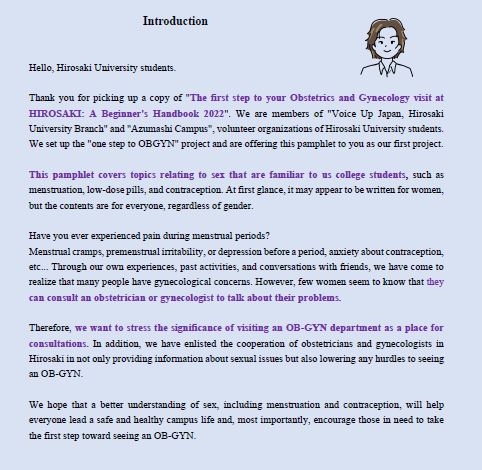
02 Feb The first step to your Obstetrics and Gynecology visit at HIROSAKI: A Beginner’s Handbook 2022
Here you will find information which everyone, regardless of gender, should know.
Published by Azumashi Campus and Voice Up Japan Hirosaki
Supervised by 3 OB-GYN doctors in Hirosaki
Translated into English by NPO SEMI Sapporo
Illustrations by Ami Takahashi
SEMI Sapporo has a great many clients who visit obstetrics and gynecology departments in Sapporo, ranging from single female students and researchers to those who will become mothers for the first time. We are delighted to have found this booklet called “The first step to your Obstetrics and Gynecology visit at HIROSAKI: A Beginner’s Handbook 2022” made by Hirosaki University students. International students and researchers from abroad can benefit from this book. We would like you to become comfortable visiting obstetrics and gynecology departments in Japan. That is why we have translated some chapters into English on our website with the publisher’s permission.
From our experiences as medical interpreters, we would like to emphasize that knowing about contraception and abortions will help you be better prepared upon coming to Japan.
The original content is here ⇒日本語
The first 4 chapters will be translated into English by SEMI.
Chapter 1: Is my period normal?
Chapter 2: Low-dosage pills
Chapter 3: Visiting OB-GYN departments
Chapter 4: Contraception, Pregnancy, and Abortions
*Only chapter 1 is being translated at this time, but chapters 2, 3, and 4 will be translated soon.
Introduction
![]() Hello, Hirosaki University students.
Hello, Hirosaki University students.
Supervising OB-GYN doctors
We have asked three doctors to supervise the writing of this handbook, “The first step to your Obstetrics and Gynecology visit at HIROSAKI: A Beginner’s Handbook 2022”, in order to convey accurate medical knowledge and to provide messages from actual obstetricians and gynecologists.
The doctors are:
Miki Saito M.D. (Vice President of Tsugaru Hoken Medical Co-op Kensei Hospital)
Yutaka Hasuo M.D. (Director of Aomori Women’s Health Care Institute)
Yoshihito Yokoyama M.D. (Professor at Department of Obstetrics and Gynecology, Hirosaki University, Graduate School of Medicine)
The answers in the Q&A in each chapter are provided by these doctors.
In addition, they have written messages for students!
Chapter 1: Is my period normal?
Menstrual cramps and irregular periods depend on body constitution?
Menstrual cramps and irregular periods could signal the need to see an OB-GYN.
“When I have my period, I get cramps and lower back pain, and it’s uncomfortable, but everyone puts up with it, right?”
“I have irregular periods, but I wonder if others do.”
Have you ever had these questions?
It’s difficult to know what a “normal period” is. It’s not always easy to seek advice even when it’s bothering you.
First and foremost, menstrual cramps are not something you need to put up with.
Some may have heard “if you take the painkillers too often, they will stop working”.
However, that is not the case. As long as you take the correct dosage, there is no problem.
If you take them after you have already experienced some pain, they may not work. The medications seem to work better when you take them at the time you feel “I think I’m getting cramps”.
How much pain you feel depends on the individual. If there is any occasion when you are experiencing a great deal of pain, we advise you to see an OB-GYN specialist.
A normal menstrual cycle (from the first day of your period to the day before your next period) is said to be 25 to 38 days. If your period is shorter or longer than this, you may have an irregular period. Especially, missing your period for three months or more is a condition called amenorrhea and should not be left untreated. If you’re unsure about your menstrual cycle, start tracking it on the first day of each period. You can easily track your cycle with an app.
These conditions may be hidden reasons for an abnormal period.
Some of you may be thinking, “Do I need to go to a hospital just because my period is a little heavier?” Although there are individual variations in the amount of menstrual blood and a cycle’s regularity, these symptoms can be a sign of an illness.
For example, if you have severe menstrual cramps, you may have a condition called endometriosis, which affects 1 in 10 women. If left untreated, it can cause infertility.
In addition, symptoms such as abdominal cramps, back pain, nausea, headache, fatigue/weakness, loss of appetite, irritability, depression, and diarrhea during menstruation are called dysmenorrhea. Continuously enduring these symptoms is not good for the body. If you are diagnosed with dysmenorrhea after a visit to an obstetrician/gynecologist, you can receive treatment covered by health insurance. ( →For details, see the explanation of low-dose pills in the second chapter.)
Irregular menstruation may be caused by stress or excessive dieting, but it may also be the result of ovarian or hormonal disorders such as polycystic ovary syndrome (PCOS). These disorders may cause infertility. If you feel any abnormal symptoms, please consult your obstetrician or gynecologist.
It is important to know your body well enough to recognize abnormal menstruation.You don’t want to be more worried than necessary about monthly physiological phenomena. Learning more about menstruation allows you to lead a more comfortable daily life!
What to watch out for when using sanitary products
Using the same sanitary napkin for hours is dangerous.
When it’s difficult to go to the bathroom frequently, or when you have to sit for long periods of time in class, you may end up using the same napkin or tampon for hours on end. Doing this can be bad for your body.
In particular, prolonged use of tampons without replacement can make your vagina a perfect environment for bacterial proliferation, which is known to cause a dangerous condition called toxic shock syndrome.
Generally, one tampon can be used for 4 to 8 hours. Avoid wearing a single tampon for more than 8 hours.
How to find sanitary products that best suit you
What kind of sanitary products are you using? In Japan, many women prefer to use sanitary pads, but there are various types of products for periods. Try various products to help you feel more comfortable during your period.
 Sanitary pads (disposable) ¥200 – 300/20 pads (regular size, with wings)
Sanitary pads (disposable) ¥200 – 300/20 pads (regular size, with wings)
This is the most common type of product for periods. They come in various sizes. The wing-type is good for preventing leaking.
 Tampons (disposable) ¥300-400 / 10 per box (regular size)
Tampons (disposable) ¥300-400 / 10 per box (regular size)
Tampons are inserted into the vagina. (This may not be easy for those who have never had sexual intercourse.) Tampons can be more comfortable since you don’t feel the blood flowing out.
 Period cloth pads from¥1000 or over /1 pad (regular size)
Period cloth pads from¥1000 or over /1 pad (regular size)
Cloth pads are especially good for those with sensitive skin. You can use them repeatedly, so they’re cost-friendly. They can be washed with detergent or sodium sesquicarbonate to remove blood stains.
 Menstrual cup ¥3000 – 5000 / per cup
Menstrual cup ¥3000 – 5000 / per cup
You insert the cup into your vagina. Once it is filled with blood, you flush the blood down the toilet, wash out the cup, and reinsert it. Sterilize it before your next period. It absorbs more blood than tampons.
 Absorbent panties (period pants) ¥1000-5000/per pants
Absorbent panties (period pants) ¥1000-5000/per pants
This underwear is designed to soak up menstrual blood without using sanitary pads. If you wear them, you’ll be less worried about periods that come suddenly. You can use them  repeatedly by washing them.
repeatedly by washing them.
Q&A Ask your OB-GYN.
 Is my period normal?
Is my period normal?
If I feel that it is not normal, can I go to an obstetrician/gynecologist?
What is a “normal” period is different for each person.
If you feel it is especially heavy or painful, please consult your obstetrician/gynecologist.
Menstruation usually lasts from 3 to 7 days, and the amount of blood loss is said to range from 20 to 140 g. Menstruation that lasts more than 8 days is called “prolonged menstruation”, and menstruation that exceeds 140 g is called “excessive menstruation”. Since the amount of blood loss cannot be measured, the criteria for heavy menstruation are
・Symptoms of anemia
・Clots of blood the size of a 500 yen coin
・Frequent changing of sanitary napkins (e.g. a nighttime sanitary napkin that lasts only one hour)
However, even if you do not have these symptoms, that does not mean your period is normal. If it is hard to endure, it is not normal. If you find yourself having difficulty with menstruation, the first thing you should do is to consult an obstetrician/gynecologist.
you find yourself having difficulty with menstruation, the first thing you should do is to consult an obstetrician/gynecologist.
 I easily become irritable, depressed, and tired during menstruation. Is this natural?
I easily become irritable, depressed, and tired during menstruation. Is this natural?
These might be symptoms of dysmenorrhea.
Symptoms such as abdominal pain, back pain, nausea, headache, fatigue/weakness, loss of appetite, irritability, and diarrhea during menstruation are called dysmenorrhea.  Because dysmenorrhea is considered an illness, it is covered by health insurance. Perhaps your symptoms are not due to your mood swings but to dysmenorrhea. It is a medical condition that can be cured, so please consult your obstetrician/gynecologist.
Because dysmenorrhea is considered an illness, it is covered by health insurance. Perhaps your symptoms are not due to your mood swings but to dysmenorrhea. It is a medical condition that can be cured, so please consult your obstetrician/gynecologist.



